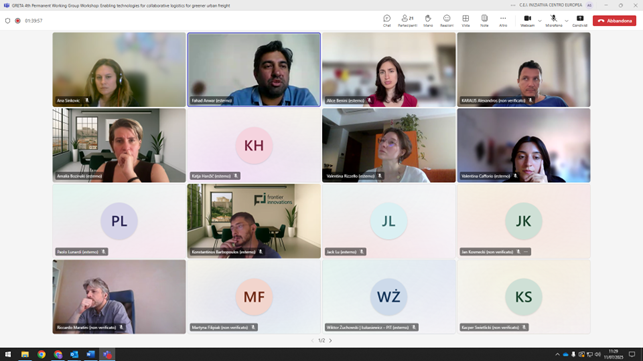. The initial presentation was provided by Mr. Fahad Anwar, from ITL, project Lead partner who highlighted GRETA objectives and the ways to achieve them. Indeed, GRETA intends to decarbonize the last mile of freight transport in FUAs by piloting innovative and transferable solutions, such as the use of zero-emission vehicles, microhubs and new curb management strategies.
Nowdays, cities around Europe face different challenges (increase in e-commerce, emissions and noise pollution from deliverer vehicles, urban congestion and costs) to make logistic chains efficient and environmentally sustainable. This calls for policy and planning, infrastructural and organizational changes, new ICT solutions and vehicle-based solutions. Indeed, several of these ideas have been used by some of the cities involved in the GRETA project. During the workshop, Mr. Paolo Lunardi, from Zailog presented the solution tested and adopted by the city of Verona to ensure better curb-side management. An IT platform was introduced to reduce the double-parking phenomenon and congestion caused by delivery vans. This solution will allow Zailog to monitor all the shipping traffic in the Verona FUA and optimize the flow of delivery vehicles in this sensitive zone.
Mr. Riccardo Maratini, from OpenEnloCC provided an insight to the regional collaborative logistics, consisting in improving efficiency and sustainability by leveraging the synergies and team-working of different actors in the supply chain.
In line with the topic, Mr. Wiktor Zukowski presented the outcomes of the SPROUT project, which provided a new city-led innovative and data driven policy response to address the impacts of the emerging mobility patterns, digitally enabled operating and business models, and transport users’ needs. He focused on an example of delivery bays located in the city of Kalisz, which faced usual problems of loading and unloading of goods in the city center (reduced parking lanes, parking maneuvers causing temporary bottlenecks, reduced road capacity during trucks loading/unloading).
The workshop offered the participants an opportunity to discuss the adopted solutions and examine the impact on the city logistics and traffic in general.
